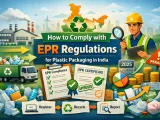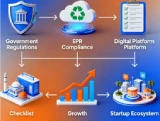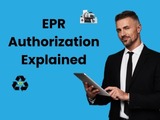In recent years, the problem of waste management has grown bigger. With more people buying goods, the volume of post-consumer waste is also rising fast. This has made the government take action. One such step is the rule of EPR authorization.
In India, this system helps control how waste from products like plastics, batteries, and electronics is processed and disposed of. This blog will help you understand what EPR means, how it works, why it is needed, and the mistakes people often make when dealing with it.
Table of Contents
What is EPR, and Why Was It Invented ?

EPR stands for Extended Producer Responsibility. It means that the manufacturers of goods are also in charge of what happens to the goods after the consumer phase of their products. If you manufacture or sell products that later turn into waste, you are the one who makes sure that the waste is collected and recycled safely and cleanly.
This rule applies to the products that cause environmental hazards if not handled well. These include:
- Plastic waste
- E-waste (like old phones or TVs)
- Battery waste
- Tyre waste
How EPR Works in India ?
In India, the Central Pollution Control Board (CPCB) and the State Pollution Control Boards (SPCBs) are the main bodies that oversee this rule. If you are a producer, brand owner, or importer, you must follow this process:

1. Get Registered
First, you must register using the CPCB online portal. This is the official site where you submit your documents and get your EPR plan approved.
2. Develop an EPR Plan
This plan should outline how you will collect the waste, including your annual recovery targets. It should also tell you how you will manage and recover the generated waste.
3. Work with Waste Handlers
You will need to collaborate with licensed waste management agencies that collect, sort, recycle, or handle the waste. These waste handlers must get official approval from the board.
4. File Reports
You must report your work every six months or once a year, depending on the rule. This report must be transparent and detailed and show your progress.
Who Needs EPR ?
EPR is not just for large companies. The following groups must also follow EPR laws:

- Manufacturers: Those who manufacture the product.
- Importers: Those who bring in goods from other countries.
- Brand owners: Those who sell under their brand but may not manufacture the product.
- Online Sellers: If you sell goods online, you still need to comply.
If you fall into any of these groups and deal with the types of waste listed above, you must apply for EPR.
What Are the Main EPR Requirements?
To stay in line with EPR requirements, here is what you must do:
- Get the EPR Certificate: This certificate shows that the CPCB or SPCB has approved your plan.
- Form Agreements with Authorised Recyclers: You must collaborate with certified recycling agencies that can handle and recycle waste.
- Achieve Annual Collection Targets: Every year, you are told how much waste you must collect or treat. You must meet those targets.
- Maintain Proper Documentation: All invoices, work orders, and contracts with recyclers must be kept safe. You may need to show them during checks.
- Pay Applicable Charges: Registration charges and penalties are charged if you break any rules.
The Benefits of EPR
Following EPR rules has many advantages. Let’s look at some:

1. Helps Nature
Waste harms land, water, and air when left in the open. By treating waste the right way, EPR helps save the planet.
2. Makes You Trustworthy
Customers today look for eco-friendly choices. If your firm follows EPR regulations, people will see you as clean and safe.
3. Avoid Fines
If you don’t follow EPR, you may face huge fines or even legal action. By doing what is needed, you stay safe from trouble.
4. Boosts the Recycling Field
EPR makes companies work with certified recyclers and waste managers. This helps grow jobs and new ideas in the recycling field.
5. Improves Supply Chain
EPR makes you think of waste at every step, from manufacturing the product to selling and after use. This leads to better design and smart packing.
What is the Process for Getting EPR Registration ?
Here is how you can get EPR registration step by step:

1. Prepare Your Documents
You’ll need the following:
- GST certificate
- Government-issued PAN
- Business registration proof
- IEC (Import Export Code)
- Product category detail
- Estimated production and sales data
2. Visit CPCB Portal
Go to the CPCB’s authorised site and create your account. You will get a username and password. This is where you’ll submit your EPR application.
3. Fill Out the Online Form
Submit the online application form. Upload the required documents, product info sheets, and supporting files.
4. Wait for Review and Verification
The CPCB will evaluate your details. If everything is valid, they will issue your EPR certificate.
5. Start Your Action Plan
Once you are registered, start your waste management activities. Make contracts with recyclers and begin collecting or disposing of waste.
Common Pitfalls in EPR Compliance
Even when people mean well, they often make mistakes while trying to follow EPR compliance rules. Read below some of the common errors:

1. Late Registration
Many businesses think they can start selling and apply later. That is wrong. You must get EPR approval before you begin selling products.
2. Fake Recycling Agencies
Some people team up with handlers who don’t really treat waste. Always work with approved and listed recyclers.
3. Poor Records
Not keeping bills, reports, and proof of recycling is a major error. Without these, you can’t show that your plan works.
4. Missing Reports
You must file reports at the set time. Missing one can cause fines or even suspension of your EPR license.
5. Ignoring Rule Changes
EPR rules may change from time to time. You must keep track of and follow any new steps or updates.
6. Low-Quality Action Plans
Some firms write vague or poor plans that don’t show real steps. This can lead to rejection or failure during review.
Working under the guidance of a trusted EPR compliance service, businesses can simplify their process of compliance, avoid costly mistakes, and focus on running their businesses confidently.
Things to Consider for Smooth EPR Approval

1. Use Real and Correct Data
Don’t predict or make up numbers. Use real figures from your business. Wrong or fake data will get your application rejected.
2. Make a Clear and Simple Plan
Your EPR plan should explain exactly how you will collect, store, and send waste for recycling. Make sure it is concise and straightforward to understand. Don’t use confusing words or long sentences.
3. Pick the Right Recycler
Choose waste handlers or recyclers who are approved by the CPCB or your state board. Make sure they have a license and a good record. Do not work with unknown or unapproved waste managers.
4. Do Not Copy Other Reports
Every business is different. Do not copy plans from others or use fake templates. The board checks for this and can reject your application if it finds copied content.
5. Keep Your Documents Ready and Safe
Gather all important documents like GST, company PAN, Import Export Code (IEC), product information, and other legal files. Scan and save them clearly. You will need them during the online process and future checks.
Getting help from trusted EPR firms can save you time and stress. These experts know the rules and can help you avoid trouble.
Why Is It Hard to Get EPR authorization ?
Some people find it hard to get EPR authorization approved because:
- The rules are strict
- The process is long
- There is too much paperwork
- One small mistake can cause delays
- The checks are done in clear detail
This is why many companies now work with EPR experts. These experts know the ins and outs of the process so that they can handle your application from start to end.
What Happens If You Don’t Follow EPR Laws?
Breaking the rules can bring serious trouble. These include:
- Fines: You may be charged a lot of money
- Ban on Selling: Your firm may be stopped from selling goods
- Legal Action: You will face court cases or even a jail term
- Loss of Trust: Customers may stop trusting your brand.
So, it is always best to stay on the right path and follow the rules.
Final Words
EPR authorization shows that your business cares about the planet and handles waste correctly. It promises to care for the earth even after the product is sold. The process may seem difficult, but the benefits are huge and long-term. It builds trust and protects your organisation from legal issues.
If you are a brand owner, importer, or producer, now is the time to act. Understand the guidelines, map your EPR strategy, and avoid frequent mistakes. Doing this allows you to adhere to the law and become part of a cleaner world.





